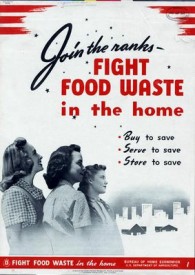There were two fascinating tidbits in Wednesday’s Sightline Daily news roundup from our pals at the Stockholm Environment Institute. And both of them demonstrate how math can provide a useful perspective on sustainability challenges.

The first article compared the climate impacts of food composting with not wasting food in the first place. Unsurprisingly, the research shows that it’s better to eat food before it spoils than to let it spoil and then compost it. But how much better? According to the Oregonian, SEI’s calculations show that “not wasting food saves 30 times more than the emissions that come from food disposal.” [Wonk alert — as commenter Dave correctly points out below, that Oregonian quote doesn’t accurately represent SEI’s research. Dave’s best estimate from SEI’s sources is that reducing food waste by 5-50% has somewhere between 3 and 113 times the GHG reduction potential as composting. My mid-point estimate (not Dave’s) from Dave’s figures is that reducing food waste has about 25 times as much GHG-reduction potential as composting — but that’s just a rough estimate, and will obviously depend on the specifics.]
So if we’re concerned about climate change, we should probably concentrate more on reducing food waste than on getting people to compost their food scraps. That’s not to say that composting programs aren’t a good idea—they are! Yet to me, the numbers that SEI ran reveal a curious, deep-held bias in public policy. We pay an awful lot of attention to how we throw our waste away—we run major public campaigns to promote recycling and stop litter. But we don’t make nearly enough effort to keep things out of the waste stream in the first place.
The second article covered SEI’s comprehensive inventory of greenhouse gas emissions in Oregon—including out-of-state emissions from the goods and services that Oregon residents consume. As you might guess, the study found that locally-produced goods have a lower carbon footprint—but not for the reasons you’d think. According to David Allaway of the the Oregon DEQ:
It’s not because of freight – everyone thinks it’s because of freight. The emissions from freight are surprisingly small. It’s because production here in the United States tends to be cleaner and use lower carbon-fuel mixes than production in the countries that we tend to import a lot of products from. [Emphasis added]
That matches with my intuitions—but that’s only because I work with these sorts of numbers an awful lot. As it turns out, moving people takes a lot of energy: we like a lot of space, and we’ll often move a ton of vehicle per person when we take long trips. But shipping goods takes less energy than you might imagine: you can pack an awful lot of stuff into a shipping container, and rail and boats are fairly efficient ways to move things around.
In both cases—food waste and long-distance freight—the math reveals a distinctly human foible. When we think about a long and complicated process, the last few steps loom large in our thoughts. For food, we concentrate on shopping bags and food scraps; for freight, we think about how the goods got to the store.
Sometimes the mental shortcut works. The biggest climate impact of your car, for example, really is what comes out of the tailpipe; vehicle manufacturing is still important, but not nearly as much as driving. But for many other issues, you simply can’t count on your intuitions. Like it or not, if we want to make sure we’re concentrating our efforts where they can do the most good, someone actually has to do the math.


Comments are closed.